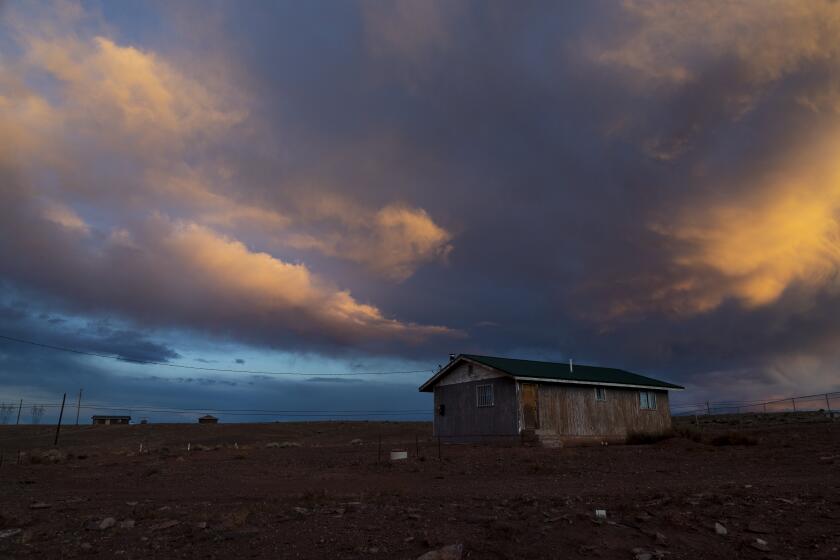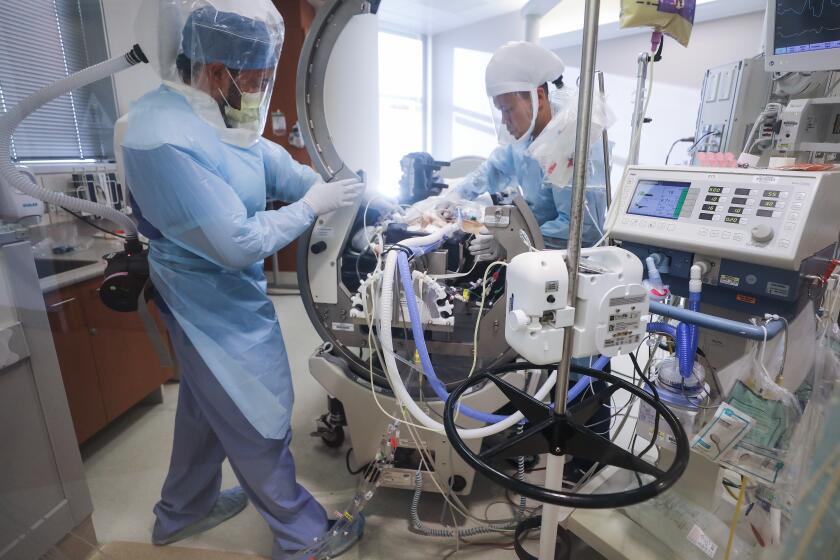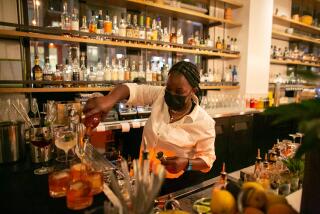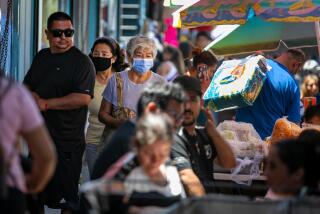Partygoers have been packing Arizona bars. Now the state is a coronavirus hot spot

- Share via
SCOTTSDALE, Ariz. — On Friday night, like nearly every other weekend for the past month, the bars and nightclubs in downtown Scottsdale were packed.
Dance floors were jammed. Lines to get in stretched for blocks. And almost nobody wore masks or gloves.
When Gov. Doug Ducey lifted Arizona’s stay-at-home order May 15, giving the green light for much of the state’s economy to restart, he said residents had the right and responsibility to gauge the risks posed by the novel coronavirus and to act accordingly.
“What an Arizonan decides to do is up to them,” he said.
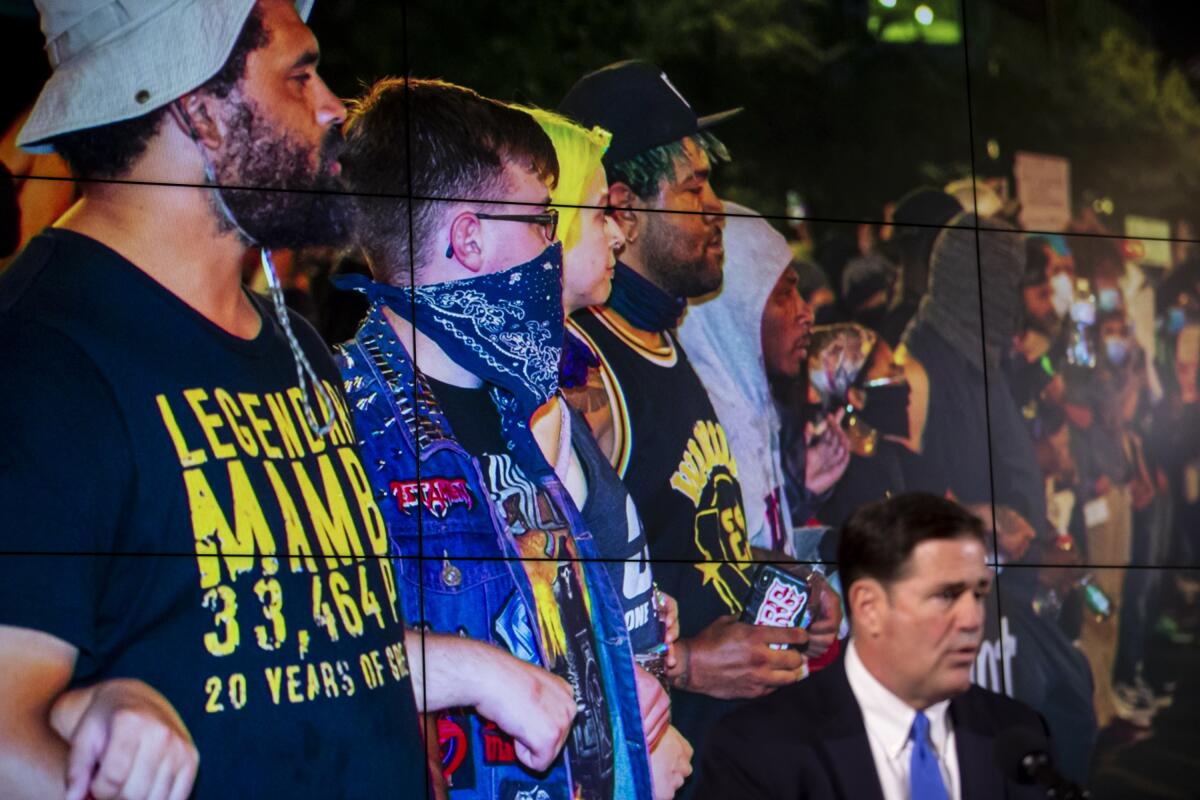
Now, as confirmed cases of COVID-19 soar here, making Arizona a national hot spot for new infections, it’s becoming clear that many residents chose to go back to life as normal as if nothing had changed.
Nowhere is that more evident than in the state’s thriving bar and nightclub scene.
“When I see packed nightclubs, I’m deeply concerned,” said Phoenix Mayor Kate Gallego, who is one of a growing number of local officials in the state calling on Ducey to better regulate the industry.
“It sends this message that we’re through this — that we’ve defeated it.”
For a while, it appeared Arizona had done a good job of containing the virus.
Coronavirus anxiety is running high on Navajo Nation — a sprawling reservation of 175,000 residents, scarce supplies and resources, and only four inpatient hospitals. Cases are soaring, and at least two already have died.
While an outbreak on the Navajo Nation in the northeastern corner of Arizona caused alarm, the state as a whole reported an overall decline in new coronavirus cases last month.
That trend has reversed itself in recent weeks.
The state recorded 7,121 new cases between May 31 and June 6 — a 54% increase over the previous week and the largest week-to-week increase since the pandemic began.
Arizona has also seen a spike in hospitalizations, with 1,400 people hospitalized on Friday, up from 755 a month earlier. ICU capacity in the state has passed 80%, according to the Department of Health Services.
Arizona is one of 22 states that have seen the number of new daily cases rise — which health experts say is likely a result of the end of stay-at-home orders.
While officials in some places, including New York and Texas, have responded by threatening to renew lockdowns, Ducey is not considering additional shutdowns and says Arizona must stay the course.
“This virus is not going away,” he said at a news conference last week. “This virus is something we need to learn to live with.”
Ducey suggested the recent spike in new cases is due to more testing.
But data show that the percentage of positive tests has been rising sharply, from 5% in May to 13% in recent days.
“It’s very alarming,” said Will Humble, executive director of the Arizona Public Health Assn. and former state health director under Republican Gov. Jan Brewer. “It’s squandering the sacrifices people made.”
Humble believes a few adjustments, such as requiring Arizona residents to wear masks in public spaces, could help the state contain the pandemic. Another helpful change, he said, would be to better control activities in bars and clubs, including limiting capacity.
“There’s lots of layers of things we need to do to slow the spread of the virus, and that’s one of them,” he said.
With cases surging in more than 20 states, there is no clear divide between states that reopened early and those that took more time.
Nightclubs are especially incompatible with social distancing. People go to bars for social interaction. Add alcohol to the mix, and even the best intentions can go out the window.
“Drunk people don’t conduct themselves responsibly,” said Sean Badger, who owns Bar Smith in Phoenix, which recently reopened.
He thinks the state allowed bars and clubs to open too soon but said he felt compelled to restart his own business when others did.
“We open tomorrow ... If you don’t like it, call the governor’s office,” he wrote on his bar’s Facebook page. “He should have kept us all safe, but instead we move forward.”
Arizona never technically gave bars and clubs the green light to reopen.
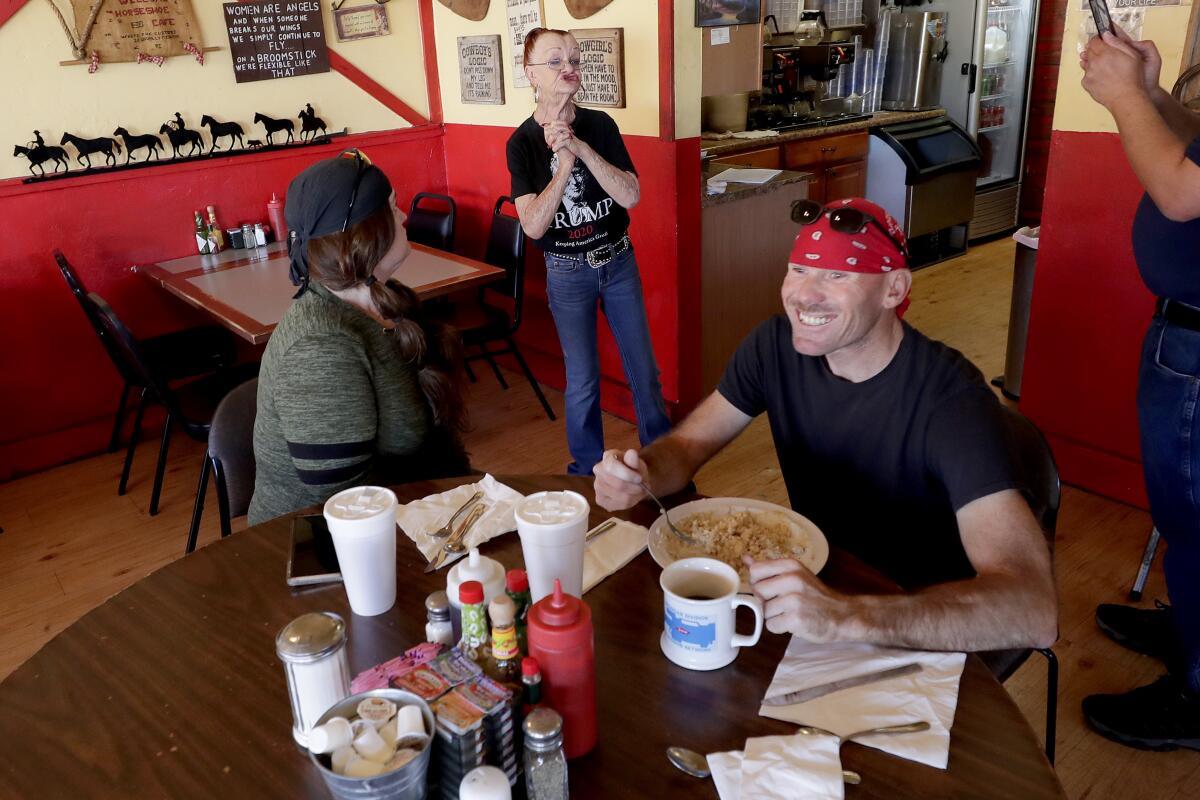
But after Ducey allowed restaurants to resume indoor dining on May 15, some bars found a loophole. Many started offering food, such as chips, which they said qualified them as restaurants.
Soon, images of bars teeming with partygoers began circulating on social media, and visitors from other states with stricter social distancing guidelines, including California, began flocking in.
In one video, boxer Floyd Mayweather is shown in a standing-room-only crowd at Scottsdale’s International Boutique Nightclub.
Scottsdale Mayor Jim Lane reacted angrily on Twitter, saying the fact that people were flocking to bars was “disturbing” and showed a “real lack of common sense and civic responsibility.”
He met with bar owners, many of whom have erected plastic partitions between tables in an effort to stop transmission of the virus. Lane, a Republican, said the onus is also on patrons.
“We like to treat our citizens as adults and solicit their cooperation,” he said.
Other local leaders say they would like to do more to regulate the industry but can’t because of an executive order from Ducey that restricts mayors’ ability to set stricter social distancing guidelines than those at the state level.
“I’m frustrated that cities have been preempted,” said Gallego, the Phoenix mayor, who is a Democrat.
In Maricopa County, where Phoenix and Scottsdale are located, 27% of cumulative coronavirus infections occurred in the last week, she said.
“What we’re doing at the state level is not working right now.”
She said she understands why people are eager to go to bars after months of having to stay at home.
Even for those who worry that it is too soon to be in public places, the allure of good music and cold drinks can be too much. For months, 28-year-old Lexie Palermo had been religious about social distancing. On Friday, she met up with a few friends for dinner, then planned to head home for yet another quiet night in. Instead, the group found itself drawn to Bevvy, one of two dozen bars located in downtown Scottsdale.
As she danced and drank icy Moscow mules, Palermo felt the sting of guilt. “Bad call,” she said. “It is the one thing I swore I would never do.”
Others felt no such shame.
“If you’re at risk or you’re old or you’re sick, you need to stay home,” said Austin, a young man who identified himself as a hedge fund manager and declined to give his last name.
“If you’re healthy and young, you need to be out here spending money to help the economy.”
More to Read
Sign up for Essential California
The most important California stories and recommendations in your inbox every morning.
You may occasionally receive promotional content from the Los Angeles Times.
